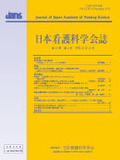Japanese
English
- 販売していません
- Abstract 文献概要
- 参考文献 Reference
要旨
目的:認知機能低下傾向にある地域在住高齢者を対象として行った懐メロを用いた回想法の効果を明らかにする.
方法:懐メロを用いた回想法は,A村健康福祉センターで2012年9月〜翌年3月まで1回/月,2時間/回,全6回(2月除く)を実施した.対象者は,地域在住高齢者で認知機能低下,閉じこもり傾向と判定された11人(平均年齢82.9歳,SD±6.3)とした.評価は,改訂長谷川式簡易知能評価スケール(HDS-R),Mini-Mental State Examination(MMSE),主観的健康感VAS(以下,主観的健康感尺度とする)などを用い,前後差についてウィルコクソンの符号付順位和検定で分析を行った.
結果:HDS-Rと主観的健康感尺度は,セッション前より後の値が有意(p<0.05)に高かった.HDS-RとMMSEについては,下位項目のうち遅延再生の項目のみ,セッション前より後の値が有意(p<0.05)に高かった.
結論:懐メロを用いた回想法は近時記憶能力と主観的健康感の改善に有効であることが示唆された.
Objective: To determine effects of reminiscence using nostalgic songs on community-dwelling elderly with declining cognitive function.
Method: Using nostalgic songs, a reminiscence trial was conducted in the Health and Welfare Center of Town A once a month. The study was conducted for six sessions, each session lasting two hours, from September 2012 to March 2013 (except February). Participants were 11 community-dwelling elderly residents who demonstrated declining cognitive function and a tendency to seclude themselves in their rooms (average age: 82.9±6.3 years old). Hasegawa's Dementia Scale-Revised (HDS-R), Mini-Mental State Examination (MMSE), the 15-item Geriatric Depression Scale (GDS-15), Philadelphia Geriatric Center Morale Scale (PGC) and subjective health VAS were used for evaluation. A statistical analysis was performed using Wilcoxon signed-rank test for differences.
Result: Following all the session, both the total HDS-R and the subjective health VAS scores were significantly improved compared with pretrial scores (p<0.05). Among the subscales of HDS-R and MMSE, only “delayed playback” was significantly improved following the sessions (p<0.05).
Conclusion: We demonstrated the possibility that reminiscence using nostalgic songs may effectively enhance retention and subjective feelings of health among the elderly with declining cognitive function.
Copyright © 2014, Japan Academy of Nursing Science. All rights reserved.


